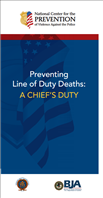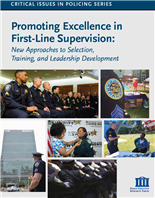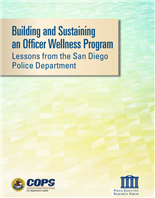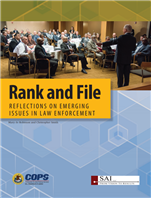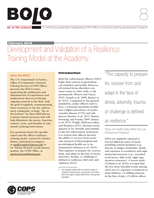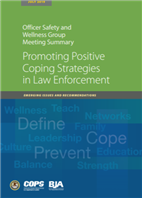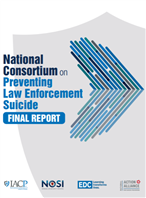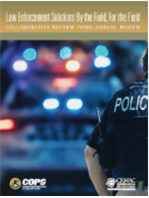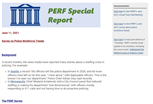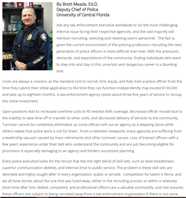Preventing Line of Duty Deaths: A Chief's Duty
This agency self assessment tool is designed to help law enforcement leaders evaluate their agency’s efforts to fully address the safety needs of their officers. Use this tool to proactively examine the range of critical officer safety strategies and determine areas where your agency can take action to improve. When taken together, the infrastructure improvements, systemic policies and strategies covered by this checklist will enhance officer safety and potentially prevent acts of violence against law enforcement.
Promoting Excellence in First-Line Supervision: New Approaches to Selection, Training, and Leadership Development
When PERF decided to hold a national conference on first-line supervision in police agencies, PERF members were asked to bring one of their top sergeants to the conference—a first-line supervisor who exemplified the qualities that agencies need to take on the challenges of modern-day policing. Fifty chiefs and sheriffs responded to the request. The sergeants and mid-level supervisors they brought to Washington, D.C. for the Critical Issues in Policing conference on April 3, 2018, were knowledgeable, articulate, and attuned to the important role they play in their agencies. They helped PERF understand how the role of first-line supervisors is changing, and what police and sheriffs’ departments need to do to keep pace with those changes. This report is intended to help refocus the spotlight on the importance of first-line supervisors to achieving effective, constitutional policing.
Building and Sustaining an Officer Wellness Program: Lessons from the San Diego Police Department
Law enforcement agencies around the country are recognizing the importance of monitoring and tending to employees' physical and mental health and wellness. This publication discusses the establishment and operation of a dedicated unit at the San Diego Police Department with the goal of promoting a department-wide culture of wellness. Working toward this goal will also help the department better serve its community. The Police Executive Research Forum, working with the SDPD under a cooperative agreement from the COPS Office, identified lessons learned and recommendations that will help guide other local agencies that may be interested in setting up similar programs.
Rank and File: Reflections on Emerging Issues in Law Enforcement
In August 2017, 40 rank-and-file officers met for a roundtable to discuss their roles in implementing their agencies' community policing policies and operations. The officers came from departments across the country and explored a wide range of issues from the viewpoint of those who work on the ground. The meeting provided insights and recommendations for ways in which officers, law enforcement leaders, and communities can work together to reduce crime - in particular illegal immigration, drug trafficking, and violent crime. They also discussed the need to support officer morale, safety, and wellness and explored emerging issues such as the growing opioid epidemic, providing forthright assessments of the current state of policing. This report intends to capture the experiences, opinions, and ideas of the participating officers; and, it should be noted, the officers’ quotes that follow do not presume to speak for the more than 800,000 agents of law enforcement working nationwide. By including and emphasizing the views and impressions of the rank-and-file, this publication offers a glimpse into the daily routine of a unique and demanding profession.
Development and Validation of a Resilience Training Model at the Academy
The U.S. Department of Justice, Office of Community Oriented Policing Services (COPS Office) presents the BOLO series, supporting the publication and dissemination of experiences and implications discovered during ongoing research in the field, with the goal of regularly communicating these resources to the law enforcement community at large. “Be on the lookout” for these field-driven, evidence-based resources that will help illuminate the nature, function, context, costs, and benefits of community policing innovations.
New Orleans Police Department's Ethical Policing is Courageous (EPIC) Peer Intervention Program Webinar
EPIC is a program developed by the NOPD in an effort to educate and support their officers in the practice of peer intervention. Through EPIC, the NOPD trains members of its department to identify and safely intervene when they believe a person is at risk for doing something that would harm themselves and/or others. This peer approach to 'policing' one another has proven to be effective for the NOPD in preventing harm and promoting officer wellness. The goal of this webinar is to highlight and bring awareness to this proactive, team-focused program as a solution to the officer safety issues that law enforcement faces today. This webinar will explore the efforts that went into gaining support for the program, steps for implementation, challenges faced, and lessons learned.
Officer Safety and Wellness Group Meeting Summary: Promoting Positive Coping Strategies in Law Enforcement
In July 2019, the Officer Safety & Wellness Group expanded on discussions of methods of supporting emotional health and organizational wellness, focusing particularly on alcoholism, substance abuse, and coping strategies officers might use to help them deal with the stressors of the job. This document serves as an official summary of that meeting and seeks to provide readers with critical information, promising practices, and recommendations from law enforcement leaders and SMEs from across the nation.
National Consortium on Preventing Law Enforcement Suicide: Final Report
This report outlines recommendations developed by the National Consortium on Preventing Law Enforcement Suicide to assist the law enforcement profession with improving access, quality, and acceptance of mental health resources and to advance suicide prevention efforts and support a culture of safety and wellness.
Law Enforcement Solutions By the Field, For the Field: Collaborative Reform Third Annual Review
The Collaborative Reform Initiative Technical Assistance Center is a partnership between the COPS Office and many professional law enforcement organizations throughout the field to provide technical assistance to law enforcement agencies on request. In its first three years, the center fielded more than 450 requests for assistance from campus, local, county, and state agencies on critical issues like community engagement; active shooter response; de-escalation; crime analysis; mass demonstrations; school safety; and recruitment, hiring, and retention. This report shows how the center has supported agencies in their efforts to ensure public safety in their communities. The COPS Office is committed to continue working diligently with our partners to provide high-quality, relevant, and timely assistance by the field, for the field.
Survey on Police Workforce Trends
To gauge whether the staffing crisis is a widespread phenomenon or is limited to a small number of departments, PERF fielded a survey of police agencies whose chief executives are PERF members. The survey was conducted from May 10 to May 21, 2021. The survey started by asking the agencies about the following: Their current staffing levels, and their numbers of authorized sworn positions (as opposed to how many of those positions are actually filled). Next, the survey asked for detailed numbers about the numbers of officers who were hired, who resigned, or who retired during the 12-month period of April 1, 2020 -- March 31, 2021. And to learn whether those numbers represented any change from the previous year, we asked for the same numbers for the period April 1, 2019 -- March 31, 2020. PERF received 194 responses to the survey. While not a representative sample of police agencies nationwide, the responses reflected a mix of departments of all sizes, as detailed below.
The State of Recruitment: A Crisis for Law Enforcement
Law enforcement agencies across the United States are struggling to recruit and hire police officers. Though agency-specific needs exist depending on size or locale, the difficulty with recruitment is a significant problem that is broadly affecting the field of law enforcement—it is not simply a result of poor agency management or localized failures. The IACP survey on recruitment demonstrates that the difficulty in recruiting law enforcement officers and employees is not due to one particular cause.
Recruiting, Selecting, and Retaining Law Enforcement Officers
Ask any law enforcement executive worldwide to list the most challenging internal issue facing their respective agencies, and the vast majority will mention recruiting, selecting, and retaining sworn personnel. This blog post discusses the challenges of recruitment and outlines a nine-step plan on how to successfully recruit and retain officers.
